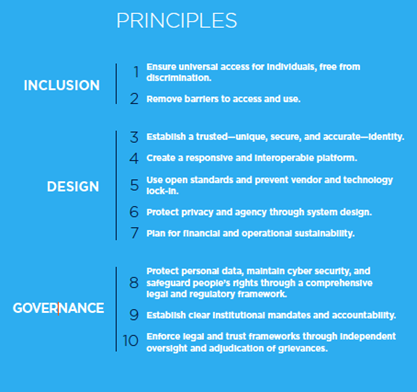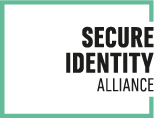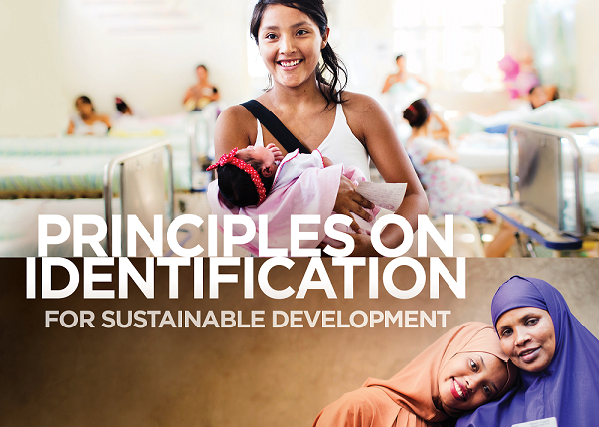10 Principles for Good ID: A 2021 Refresh
Today the refreshed Principles on Identification for Sustainable development were published. Secure Identity Alliance is proud to have once again been asked to contribute to this important body of work to ensure that these updated Principles reflect today’s changing world and its own vision of supporting the provision of legal, trusted identity for all.
Five years ago the Secure Identity Alliance, along with other organisations committed to the development of ID systems that are inclusive, trusted, and accountable and supported the development of a set of shared ‘Principles for Good Identification’.
The vision was to create a guiding framework that governments around the globe can use to ensure they build inclusive and trusted digital ID and civil registration systems that both enhance people’s lives – and empower them to gain access to social and economic opportunities.
Improving the quality, accessibility and governance of ID systems is critical for ensuring that everyone in the world has universal access to legal ID that enables them to participate fully in economic, social, and political life. Robust and secure ID systems are also vital for governments that need to efficiently administer core state services, such as education, healthcare, and emergency and disaster response.
So much so that growing awareness of the need for more inclusive, robust identification systems lead to a global call to action, embodied in Target 16.9 of the Sustainable Development Goals (SDGs): “by 2030 to provide legal identity for all, including birth registration”.
First developed and published in 2017, the Principles on Identification for Sustainable Development quickly became incorporated into global norms and policy. Indeed, countries have used the Principles to strengthen the sovereign civil registration and ID systems that provide essential proof of legal identity.
The Principles have also proved invaluable for governments that want to enable advanced digital versions of official IDs and accelerate the creation of transformative digital services:
• During the COVID-19 crisis the Philippines government was able to innovate fast, using the Principles to initiate digital registration to its social assistance program – including inclusive pathways for the elderly and those without any documentation
• Nigeria’s National identity Management Commission is using the Principles to reform and improve the country’s national ID system and implement global data privacy standards
Given the rapidly evolving nature of the ID industry, in early 2020 the World Bank ID4D team asked the Secure Identity Alliance to work alongside 28 other organizations to assess, review, and update the Principles. Following a year-long consultation process, we’re delighted to confirm that the World Bank has now published its revised edition of the Principles.
What’s changed and why
The review process highlighted how the 10 original Principles remain just as relevant and important today as they did in 2017. However, the reviewing organizations jointly identified that updating certain principles was important to ensure these reflected new realities and good practices.
In summary, these changes were focused around strengthening the language on:
• The safeguards needed to protect data and ensure non-discrimination
• The vital importance of building people-centric ID systems that are inclusive by design and address people’s real needs and concerns, especially in relation to the challenges that can emerge in the transition from manual and paper-based processes to digital ones
• The essential role that continuous stakeholder and public engagement, including with civil society, plays in achieving these goals.
From principles to practical action
Principle 5 enshrines the importance of enabling ID systems that utilize open standards to both achieve improved efficiencies and functionality and assure that ID systems can be evolved and adapted to accommodate changes over time.
Here at the Secure Identity Alliance we’re delighted that open standards and universal interoperability is identified as a key Design Principle for any government that wants to efficiently deliver public services and programs – and easily facilitate new digital modes of service delivery.
For the past three years, the Secure Identity Alliance has been working with governments around the globe to address the real-world problem of enabling interoperable and open ID systems.
Indeed, our OSIA initiative provides the open standard interfaces (APIs) that enable seamless connectivity between all components of the ID management ecosystem – regardless of technology, solution, architecture, or vendor. Today, OSIA has evolved into a vibrant community of over than 35 government organizations and ID industry bodies.
Proud to serve
Over the past 12 months, the Secure Identity Alliance has worked with 28 other leading organizations to ensure that 2021 edition of the Principles reflect the increasingly digital nature of official identification systems.
We’ve also elevated recognition of the growing need for interoperable frameworks that don’t hamper the ability of governments to innovate using emerging technologies – so they can find new ways to serve citizens better.
We are truly proud to endorse the latest envisioning of the 10 Principles. We truly believe these will provide a strong foundation for enabling better and more accountable ID systems around the globe that will power further transformational and sustainable developments for all.
The full version of the Principles is available at http://idprinciples.org/
Version française disponible ici: http://idprinciples.org/



